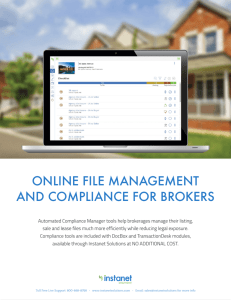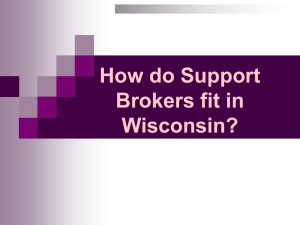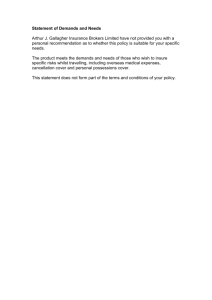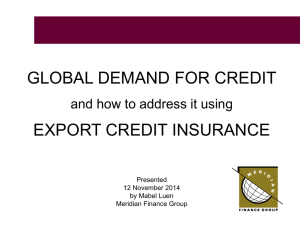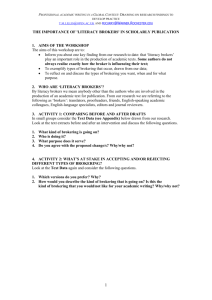"Export Credit Insurance - Most Exporters Use Brokers To Guide
advertisement
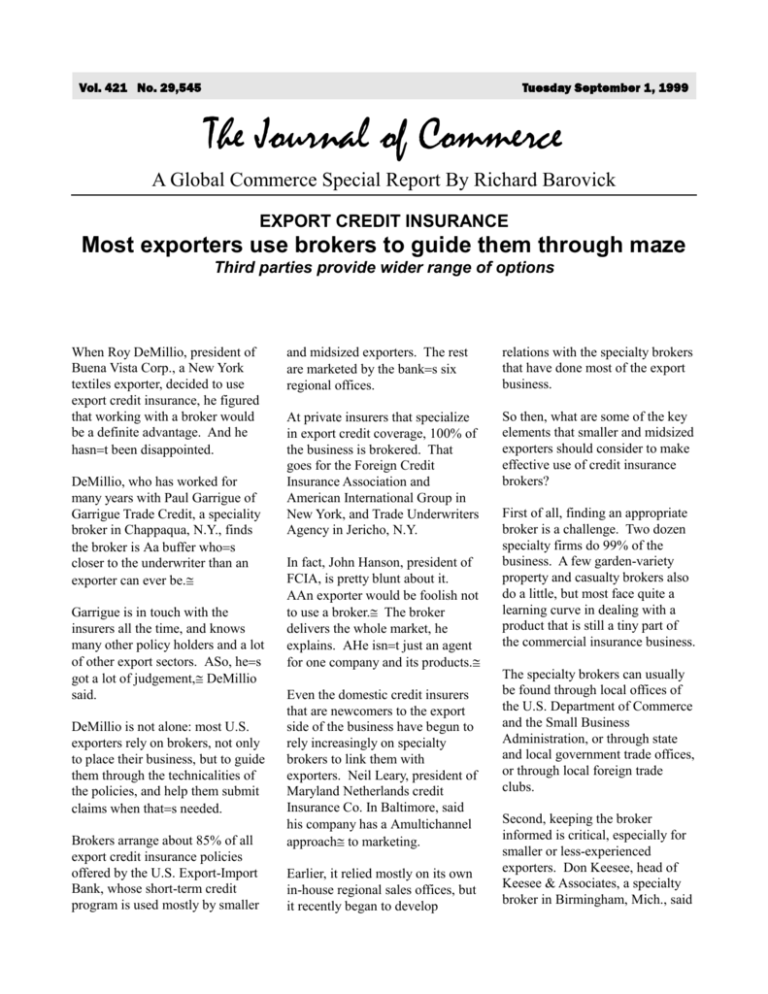
Vol. 421 No. 29,545 Tuesday September 1, 1999 The Journal of Commerce A Global Commerce Special Report By Richard Barovick EXPORT CREDIT INSURANCE Most exporters use brokers to guide them through maze Third parties provide wider range of options When Roy DeMillio, president of Buena Vista Corp., a New York textiles exporter, decided to use export credit insurance, he figured that working with a broker would be a definite advantage. And he hasnt been disappointed. DeMillio, who has worked for many years with Paul Garrigue of Garrigue Trade Credit, a speciality broker in Chappaqua, N.Y., finds the broker is a buffer whos closer to the underwriter than an exporter can ever be. Garrigue is in touch with the insurers all the time, and knows many other policy holders and a lot of other export sectors. So, hes got a lot of judgement, DeMillio said. DeMillio is not alone: most U.S. exporters rely on brokers, not only to place their business, but to guide them through the technicalities of the policies, and help them submit claims when thats needed. Brokers arrange about 85% of all export credit insurance policies offered by the U.S. Export-Import Bank, whose short-term credit program is used mostly by smaller and midsized exporters. The rest are marketed by the banks six regional offices. relations with the specialty brokers that have done most of the export business. At private insurers that specialize in export credit coverage, 100% of the business is brokered. That goes for the Foreign Credit Insurance Association and American International Group in New York, and Trade Underwriters Agency in Jericho, N.Y. So then, what are some of the key elements that smaller and midsized exporters should consider to make effective use of credit insurance brokers? In fact, John Hanson, president of FCIA, is pretty blunt about it. An exporter would be foolish not to use a broker. The broker delivers the whole market, he explains. He isnt just an agent for one company and its products. Even the domestic credit insurers that are newcomers to the export side of the business have begun to rely increasingly on specialty brokers to link them with exporters. Neil Leary, president of Maryland Netherlands credit Insurance Co. In Baltimore, said his company has a multichannel approach to marketing. Earlier, it relied mostly on its own in-house regional sales offices, but it recently began to develop First of all, finding an appropriate broker is a challenge. Two dozen specialty firms do 99% of the business. A few garden-variety property and casualty brokers also do a little, but most face quite a learning curve in dealing with a product that is still a tiny part of the commercial insurance business. The specialty brokers can usually be found through local offices of the U.S. Department of Commerce and the Small Business Administration, or through state and local government trade offices, or through local foreign trade clubs. Second, keeping the broker informed is critical, especially for smaller or less-experienced exporters. Don Keesee, head of Keesee & Associates, a specialty broker in Birmingham, Mich., said 2 Journal Of Commerce Tuesday September 1, 1999 he doesnt fill out his clients. paperwork, preferring that the exporter be more involved But, he often has clients pay their premiums through him. That way I can check their math, and be sure that the country involved is covered by the policy. And, sometimes, be sure that the premium has in fact been paid. Most insurance premiums are paid on time, within 30 days of shipment, but failure to pay a premium is perhaps the most common reason why an underwriter wont pay a claim. Some smaller exporters use an ExIm Bank umbrella policy, which provides extra help, including paying premiums and reporting shipments to the underwriter. Export Insurance Services in Atlanta, a specialty broker, delivers most of the umbrella policy business, and has developed customized computer software for that purpose. Arles Tamayo, owner of Arles International in Miami, an exporter of automotive components and spare parts to Latin America and the Middle East, uses Export Insurance Services umbrella program, and acknowledges, I dont know that Id do without it. With insurance, we have been able to get our bank to cover receivables of 180 days, whereas earlier we couldnt obtain more than 90 days. Our broker [NaviTrade] was able to find creative solutions, not just insurance. Mark Richter Chief financial officer Windsor Industries Third, structuring the right policy for an exporters business, especially where clients are located in more difficult countries, has to be one of the main contributions the brokers can make. Each insurance company has its own appetite for risk, as its called in the business, and that can shift constantly. Brokers know all of the underwriters, and can help their clients find the best policy for their sales patterns. Over the past two years this has sometimes been a severe challenge for covering sales to financially strapped Asian markets. Brent Hoots, head of NaviTrade Structured Finance in Niwot, Colo., was able to help a miningequipment manufacturer client arrange cover for sales to Indonesia, then a risky proposition. It did so by placing a policy with an insurer that was willing to cover a flow of transactions to multiple markets, including Indonesia. NaviTrade had to identify an underwriter willing to do so, and to structure the policy so that a balance between risky and safe markets was created. This shopping around is a major benefit for exporters that specialty brokers can provide. Finally, credit insurance is often viewed as a part of a larger financing strategy. Many exporters use it to obtain bank financing, by assigning the policy to a lender, The latter can discount the foreign receivables, thus helping the exporters cash flow, by relying on the insurance to cover repayment risks. In some cases, specialty brokers will help find and work with banks that are willing to accept the policy as a source of creditworthiness. But in some cases brokers go even beyond insurance to put together more complicated financing packages. Mark Richter, chief financial officer at Windsor Industries in Englewood, Colo., a manufacturer of commercial and industrial floor cleaning equipment, has worked closely with NaviTrade Structured Finance for the past three years. With insurance, we have been able to get our bank to cover receivables of 180 days, whereas earlier we couldnt obtain more than 90 days, he said. Our broker [NaviTrade] was able to find creative solutions, not just insurance, Richter said. In some cases that meant setting up leasing subsidiaries in Europe to ease the financing burden of the commercial cleaning contractors that buy its equipment. Putting insurance and financing packages together has made all the difference, he added. 3 Journal Of Commerce Reprinted with permission from the Journal of Commerce. Tuesday September 1, 1999

